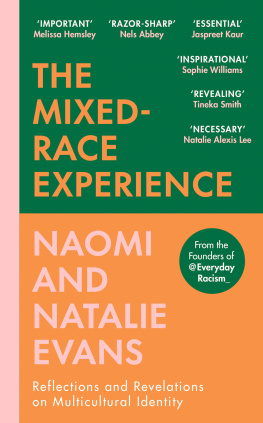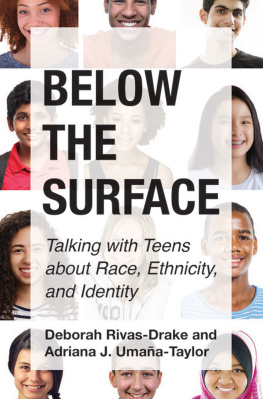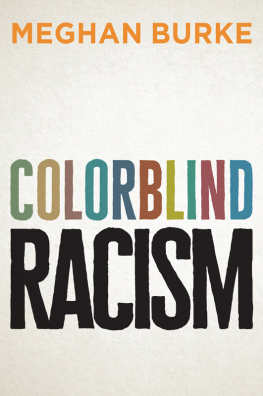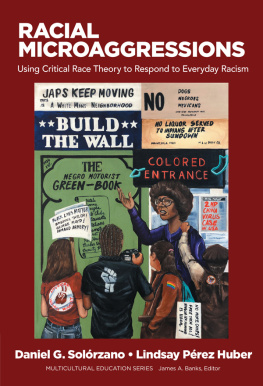
Talking Race in Young Adulthood
At a time in which race lies at the heart of so much public debate, Talking Race in Young Adulthood comes at an important moment.
Drawing on ethnographic research with young adults in Manchester, Harries engages with ideas of the post-racial to explore how young adults make sense of their identities, relationships and new forms of racism, consequently revealing how and in what ways race remains a salient dimension of social experience. Indeed, this book presents news ways of thinking about how we live with difference, as Harries analyses the relationship between racism, generational identities and the spatial configurations of a city.
Offering a distinct contribution to the sociology of race, this book will appeal to undergraduate and postgraduate students interested in fields such as Race and Ethnicity, Urban Sociology, Human Geography, Youth Studies, Cultural Studies and Social Anthropology.
Bethan Harries is a Research Fellow in the Department of Sociology at the University of Manchester, UK
Routledge Research in Race and Ethnicity
For a full list of titles in this series, please visit www.routledge.com/sociology/series/RRRE
19 Mapping the New African Diaspora in China
Race and the Cultural Politics of Belonging
Shanshan Lan
20 Doing Violence, Making Race
Mattias Smangs
21 Critical Reflections on Migration, Race and Multiculturalism
Australia in a Global Context
Edited by Martina Boese, Vince Marotta
22 Mixed Race in Asia
Past, Present and Future
Zarine L. Rocha and Farida Fozdar
23 Lived Experiences of Multiculture
The New Social and Spatial Relations of Diversity
Sarah Neal, Katy Bennett, Allan Cochrane and Giles Mohan
24 The Body, Authenticity and Racism
Lindsey Garratt
25 Australias New Migrants
International Students Affective Encounters with the Border
Maria Elena Indelicato
26 Talking Race in Young Adulthood
Race and Everyday Life in Contemporary Britain
Bethan Harries
First published 2018
by Routledge
2 Park Square, Milton Park, Abingdon, Oxon OX14 4RN
and by Routledge
711 Third Avenue, New York, NY 10017
Routledge is an imprint of the Taylor & Francis Group, an informa business
2018 Bethan Harries
The right of Bethan Harries to be identified as author of this work has been asserted by her in accordance with sections 77 and 78 of the Copyright, Designs and Patents Act 1988.
All rights reserved. No part of this book may be reprinted or reproduced or utilised in any form or by any electronic, mechanical, or other means, now known or hereafter invented, including photocopying and recording, or in any information storage or retrieval system, without permission in writing from the publishers.
Trademark notice : Product or corporate names may be trademarks or registered trademarks, and are used only for identification and explanation without intent to infringe.
British Library Cataloguing-in-Publication Data
A catalogue record for this book is available from the British Library
Library of Congress Cataloging-in-Publication Data
A catalog record for this book has been requested
ISBN: 978-1-138-12085-3 (hbk)
ISBN: 978-1-315-65148-4 (ebk)
Typeset in Times New Roman
by Apex CoVantage, LLC
Hope is the thing with feathers.
Emily Dickinson
I have been lucky to receive support and advice from lots of people in the process of writing this book. I would particularly like to thank Bridget Byrne who has been an incredible, patient and generous source of support throughout my PhD and beyond, including during this book. Thanks also to my colleagues at the Universities of Manchester, Glasgow and UC Berkeley for their supportive comments during the research and more latterly on presentations of drafts. And thank you to all those Ive conferenced with along the way.
I must express sincere thanks to dear friends who have read chapters and offered thoughtful, helpful and kind comments, but have also been there to stimulate and challenge ideas especially Abril Saldaa, Sivamohan Valluvan, Naaz Rashid, Malcolm James, James Rhodes and Andrew Taylor. Special thanks to Mart Lpez Andreu who has always been there to listen and has encouraged me to the end.
Most importantly, I am hugely grateful to the young people who allowed me in to their lives and gave up their time to speak to me, often at great length. Thanks also to my bandmates in Gorton who were always patient with me and to the cafs that let me sit for hours on end and often generously gave me free cups of tea.
Finally, I would like to thank the Economic and Social Research Council who funded the research for my PhD on which this book is based.
1
Introduction
Whilst I was preparing the research for this book I was also teaching an undergraduate course called, Racism and ethnicity in the UK. In one seminar I asked the students to think about how we might answer the question: What is racism? Their responses almost universally drew on historical references to situate racism firmly in the past. I then asked them specifically about racism in the present and many students appeared confused. One woman said that she remembered one incident in the police, but that was years ago she was referring to the police handling of the murder of Stephen Lawrence. Others claimed that there is no racism really, but only occasional examples of some people being mean to other people. The majority of students on this course were white. A couple of things are worth noting about these responses. In the first place, racism had been almost eradicated or suppressed from the students consciousness and second, when they did acknowledge people being mean, the relationship to structures and instruments of power was entirely absent. This anecdote is symptomatic of conditions in the UK (and elsewhere) that silence race and relegate it to the past.
Given the events and political shifts of the last year across Europe and the US we might assume that such a response in the classroom would now be different. However, whilst the pace of political change appears rapid and ferocious, we must be cautious before we suppose that the extent to which racism is recognised as a structural feature of society has moved at a similar pace. Whilst broadly speaking there is a prevailing notion that we have moved beyond race, there has always been room for exceptions within a dominant discourse. The likes of Donald Trump, le Front National, UKIP and the EDL would now fall into this camp, but prior to them it has long been possible to lay the responsibility of racism at the feet of other far right groups and to the margins of society, where, for example, the occasional racist name-calling incident on the football field is imagined as disrupting a status quo. Indeed, the presidency of Trump is treated not so much as an exception, but as an anomaly in the US and the west more broadly. Hence, he is readily recognised as racist whilst other governments (including in the UK), rarely face such accusations despite similar approaches to immigration and border control. Without diverging to discuss the kind of racism that this new wave of nationalism represents, it is worth noting how these individuals and organisations act as useful containers in which racism can be deposited and how these exceptions often act as an alibi for broader silences. Isolated events and individuals act as convenient moments in which to account for racism without dragging the rest of society into a relationship with them. Hence, the students approach a contemporary sociology course as if it is a history lesson and one that is abstracted from their own lives.






